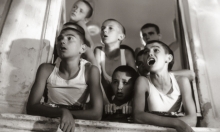
Abstract
Using Franz Fanon’s “On Violence,” this paper analyzes dynamics of power and violence in Lulëkuqet mbi Mure / Red Poppies on Walls, a 1976 Albanian film about WWII anti-fascist resistance, told through the story of a group of orphans in Italian-occupied Albania. Fanon’s explication that the colonizer’s power is founded on force and maintained through violence, capitalist exploitation, dehumanization and compartmentalization, elucidates the film. His argument that decolonization is possible only through greater counter-violence is critical in understanding why the orphans use violent means to liberate themselves. The children’s struggle against the fascist orphanage directors is noticed and harnessed Communist Party members. I argue that though the Party’s guidance helps the children fight their subjugation, it also curbs their revolutionary potential. Thus, the didactic and propagandistic goals of Lulëkuqet mbi Mure allow only for a strict cold war dichotomy: one is either a fascist, capitalist and colonizer, or a communist, revolted colonized subject ready to take up arms. My engagement with the film, however, demonstrates that the children’s solidarity with one another and their subtle resistance prior to the communists’ intervention, gestured toward an alternative way of building community – one closer to Fanon’s ideas of a new humanism, even if it ultimately remains unrealized in the film.